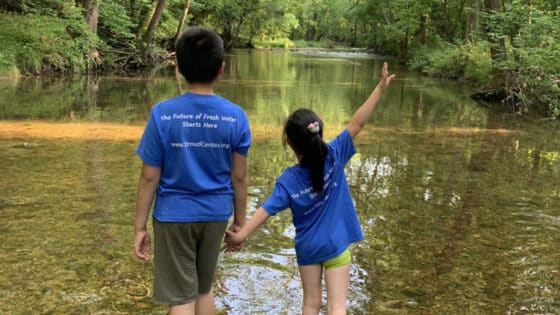SCIENTISTS ORGANIZE SPECIAL SESSION AT SOCIETY FOR FRESHWATER SCIENCE ANNUAL MEETING
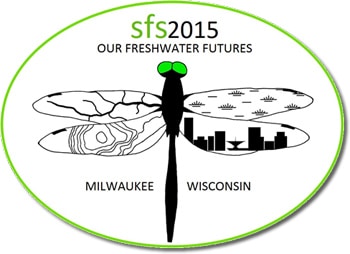 In May, Stroud™ Water Research Center scientists attended the weeklong annual meeting of the Society for Freshwater Science (SFS) in Milwaukee, Wisconsin.
In May, Stroud™ Water Research Center scientists attended the weeklong annual meeting of the Society for Freshwater Science (SFS) in Milwaukee, Wisconsin.
In keeping with this year’s meeting theme, Our Freshwater Futures, Melinda Daniels, Ph.D., Stroud Center’s fluvial geomorphologist; Lindsey Albertson, Ph.D., postdoctoral researcher; and Daniel Allen, Ph.D., assistant professor at Arizona State University, organized a special session about how interactions among species, such as competition and predation, affect physical processes and biological communities in aquatic and adjacent forest habitats.
“We hope to encourage more research related to the impacts of biodiversity loss, shifts in the presence or absence of common ecosystem engineers, such as beavers, introduction of invasive species, and food-web dynamics on physical processes related to hydrology and geomorphology,” said Albertson.
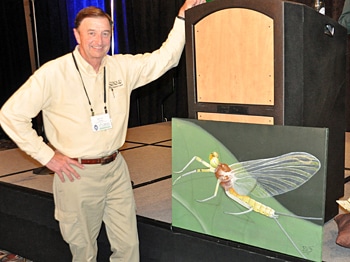
Sweeney with his mayfly painting. Photo: Mike Swift
The session drew oral presentations from colleagues around the world.
Albertson and Daniels presented their own study of how crayfish influence the movement of sediment in streambeds.
In other business, Bernard Sweeney, Ph.D., Stroud Center director, and David Arscott, Ph.D., assistant director, both associate editors for the of the society’s scientific journal,Freshwater Science, met with the editorial board at the meeting.
Also, Sweeney, who has been taking art classes for many years, donated a painting of an adult mayfly he had worked on throughout the previous year to the society’s auction.
The auction is a fundraiser that supports graduate-student participation in the society.
LEAF PACK DRAWS CROWD AT UNIVERSITY OF WISCONSIN-MILWAUKEE’S SCHOOL OF FRESHWATER SCIENCES
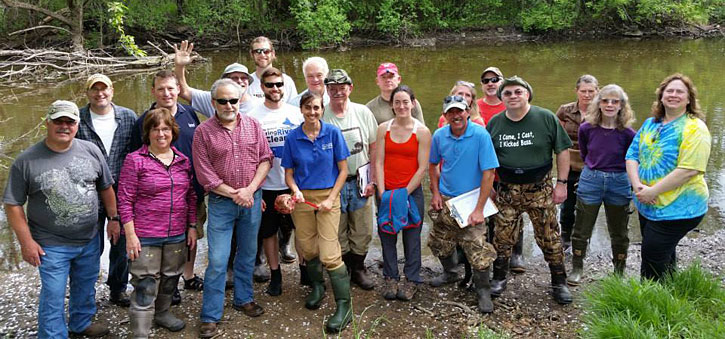 On a sunny day, Stroud Center’s Education Programs Manager and Leaf Pack Network Administrator Tara Muenz led a Leaf Pack Experiment workshop along the Mukwonago River, one of the cleanest and most biologically diverse streams in southeastern Wisconsin. The May 16 workshop, sponsored by the Society for Freshwater Science, drew more than 20 people.
On a sunny day, Stroud Center’s Education Programs Manager and Leaf Pack Network Administrator Tara Muenz led a Leaf Pack Experiment workshop along the Mukwonago River, one of the cleanest and most biologically diverse streams in southeastern Wisconsin. The May 16 workshop, sponsored by the Society for Freshwater Science, drew more than 20 people.
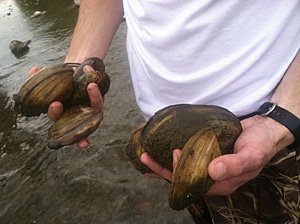
The abundance of freshwater mussels and aquatic insects made the Mukwonago River an ideal location for a leaf pack workshop.
Sweeney; Matthew McTammany, Ph.D., Bucknell University; and Jerry Kaster, Ph.D., University of Wisconsin-Milwaukee’s School of Freshwater Sciences, gave special presentations and provided hands-on assistance in identifying the various aquatic insects and animals workshop participants found.
“Freshwater mussels and aquatic insects are abundant in the Mukwonago River, so this was an ideal location,” said Muenz. “All the workshop participants were passionate about rivers, so they were eager to see how leaf packs are deployed and retrieved, and to practice identifying aquatic species. We also taught them a how to incorporate leaf packs into middle school and high school curricula.”
Participants also enjoyed a tour of the school and its world-class laboratories that included large vessels and special lake-monitoring equipment. Presentations introduced Leaf Pack Experiment methods and protocols, as well as freshwater ecology with macroinvertebrate life history.
View an album of workshop photos
WATERSHED RESTORATION OUTREACH
Public outreach and training events continue to be an important component of our Watershed Restoration team activities. So far in 2015, the team has hosted or participated in more than 10 events that have reached more than 500 individuals:
- January 28: Meeting in Honey Brook, Pennsylvania, in partnership with the Chester County Conservation District. Twenty farmers attended.
- February 3: Meeting in Kempton, Pennsylvania, in partnership with Berks Conservancy and Partnership for the Delaware Estuary – 35 farmers attended.
- February 4-6: Watershed Restoration presentations at Pennsylvania Association for Sustainable Agriculture’s 24th annual Farming for the Future Conference in State College, Pennsylvania.
- February 26: Watershed Restoration presentation at the Berks County Agriculture Innovation Workshop.
- March 10: Meeting in Bernville, Pennsylvania – 75 farmers attended.
- April 21: Presentation for erosion and sediment control engineers in Lancaster County, Pennsylvania.
- April 28: Presentations for the Berks County Canoe Club.
- April 28: Training on marketing buffers to farmers for Berks County Conservation District.
- April 28: Bern Sweeney presented a webinar on stream and buffer ecology in conjunction with Penn State Extension.
- April 30: Lamonte Garber and Tara Muenz provided stream education workshop with the Old Order Mennonite School in Tulpehocken watershed.
- May 5: Dave Wise presented a webinar on Forest Buffer Maintenance in conjunction with Penn State Extension.
- May 12 and 13: Stream and buffer ecology and implementation workshops for 95 people representing five states, three federal agencies, six state agencies, and numerous non-governmental organizations and private organizations held at Stroud Water Research Center.
NEW PUBLICATIONS
Stroud Water Research Center scientist names in bold.
- Mosher, J.J., L.A. Kaplan, D.C. Podgorski, A.M. McKenna, and A.G. Marshall. 2015. Longitudinal shifts in dissolved organic matter chemogeography and chemodiversity within headwater streams: a river continuum reprise.Biogeochemistry 124(1-3):317-385.
- Ruffing, C., M. Daniels, and K. A. Dwire. 2015. Disturbance legacies of historic tie-drives persistently alter geomorphology and large wood characteristics in headwater streams, southeast Wyoming. Geomorphology, 231:1-14.
- Walter, K.D., Gido, K., While, M.R., Daniels, M.D., Grudzinski, B.P. 2015. The stream biome gradient concept: controlling factors of streams across broad biogeographic scales. Freshwater Science, 34(1):1–19.

